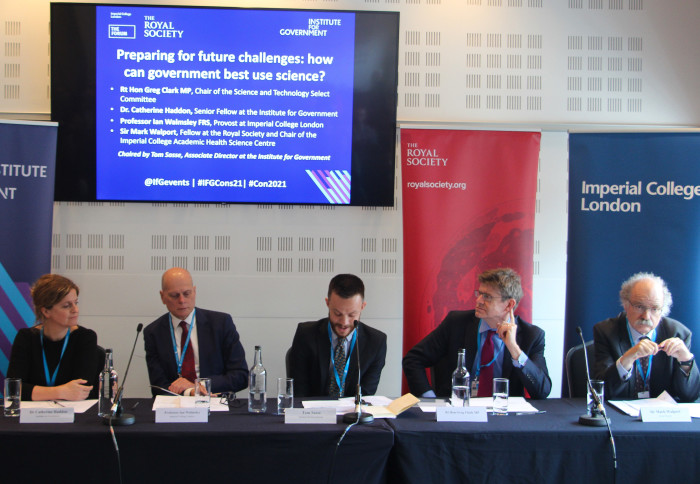Collaboration key for science Imperial Provost tells Conservatives conference

Imperial’s Provost Professor Ian Walmsley spoke at the Conservative Party conference this week on the importance of science advice within government.
The Provost was joined on the panel by Rt Hon Greg Clark MP, Chair of the Commons Science and Technology Committee, former Chief Scientific Adviser Sir Mark Walport and Dr Catharine Haddon, Senior Fellow at the Institute for Government. The event followed a similar one at the Labour Party conference last week.
Greg Clark opened the discussion with stating that the profile of science and scientists was at the highest level he could recall in his lifetime, with the British public eager to hear from scientists throughout the pandemic. He added that transparency of evidence and the basis of any decision-making was absolutely vital.

The pandemic has proven to be an occasion where the public has listened to scientists more at any other time in the course of my lifetime. Greg Clark MP Chair of the Commons Science and Technology Committee
Professor Walmsley agreed that the pandemic had given many scientists a high profile. They were regarded as a trusted voice due to presenting their arguments with both evidence and empathy throughout the pandemic.
Speaking about the future challenges the UK faces, Professor Walmsley said that the focus should be on developing resilience in the system to help mitigate the effects of any future crisis. Crucial to this is to ensure that we maintain open collaboration and mobility with research partners across the world - the government priority of making the UK a science superpower was absolutely entwined with global reach and influence.
Dr Catherine Haddon stated that governments have tended to use science as a catch-all term to solve their challenges at the time. This has resulted in a significant burden being put on scientific advice as a means of justifying current government policy as well as a misguided understanding of scientific advice and its evolving nature. Both can frustrate policymaking, as was seen in the changing advice on wearing face coverings for example.
The science superpower and global Britain agendas are absolutely entwined – crucial to any ideas ecosystem is collaboration. Professor Walmsley Provost of Imperial College London
To help resolve these conflicts, Dr Haddon believes that there should be a far greater emphasis within government on training ministers and civil servants to be good “customers” of science, so they can understand the basis and limitations of any evidence.
Former Chief Scientific Adviser Sir Mark Walport said it was extraordinary that scientific terms like the R number had received such public awareness during the pandemic. However, he warned that any effective scientific advice is naturally dependent on the long-term sustainability and health of the scientific sector. The rapid development of vaccines during the pandemic was only possible due to the long-term funding of the technology but that so far, the UK government has not taken the right action to increase scientific funding.
We won’t become a (scientific) superpower if we don’t provide the fuel. Sir Mark Walport Former Chief Scientific Adviser
Pointing to the examples of France and the US, who have significantly increased their R&D funding, he pointed out that the UK government by contrast has not yet unveiled how it will get to its target of overall R&D investment increasing to 2.4% of GDP.
The event concluded with the panel agreeing that the ability for both the UK and the world to overcome challenges such as climate change is dependent on the inclusion of scientific advice into policymaking.
Article text (excluding photos or graphics) © Imperial College London.
Photos and graphics subject to third party copyright used with permission or © Imperial College London.
Reporter
Lisa Bungeroth
College Headquarters
James Rae
Office of the President